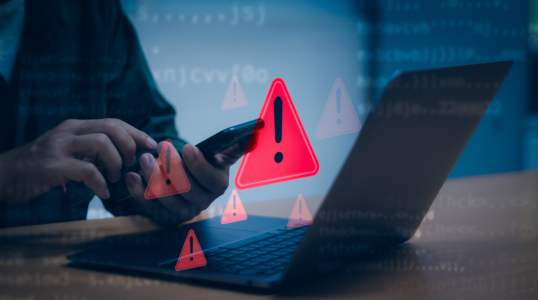Email scam cost family $500,000 during home purchase: ‘I’ve ruined our lives’
By
Gian T
- Replies 6
Buying a home is often the culmination of years of saving and dreaming. Still, this milestone became a financial disaster for one Melbourne family when cybercriminals swindled them out of more than half a million dollars.
The sophisticated scam, which involved hacking a conveyancer's email, reminds us of the ever-present dangers lurking in the digital world.
The family, who were in the process of purchasing their dream home, fell victim to a deceptively simple yet devastatingly effective scam.
The hackers accessed their conveyancer's web server and sent an email with altered bank payment details, which appeared to be a legitimate request to transfer funds.
Trusting the communication, the family complied, discovering that the request was fraudulent.
The realisation of the scam-hit hard.
‘I gave the conveyancer a call, and she said she hadn’t requested payment at all,' lamented one of the homebuyers, recounting the moment of discovery.
‘My stomach immediately dropped. I explained that the request had come from her email account, but she said she hadn’t sent it. She checked her emails and found nothing, so within a couple of hours, I was at the police station reporting that we had been scammed.’
‘There was immediate panic, stress and tears, and I said to my husband, ‘I’ve ruined our lives. That’s all of our money gone. There were a lot of tears.’
Despite the family's diligence, with one member working in finance and IT, they were not immune to the sophisticated tactics employed by modern cybercriminals.
The police investigation revealed that the email requesting funds was linked to an international IP address, and the recipient's bank account had been set up fraudulently.
To make matters worse, the stolen funds were quickly converted into cryptocurrency, making recovery efforts even more challenging.
The couple's bank and the bank used by the scammer denied liability, leaving the family in a precarious financial position.
They are now waiting to see if indemnity insurance from their conveyancer will cover the loss, but hopes of recovering the transferred funds are slim.
This incident has prompted calls for Australian banks to implement an alert system for suspicious transactions.
Julijiana Todorovic, an associate at Slater and Gordon, highlighted a 'concerning increase' in payment diversion scams.
‘This is a very difficult area of law as the cyberfraud landscape is evolving faster than the law has been able to keep up,’ she said.
Victims are often left in a difficult position, seeking compensation from conveyancers who may not have employed adequate cybersecurity measures.
The Australian Institute of Conveyancers (AIC) has taken steps to minimise risks, such as requiring members to have customers verify bank details over the phone before making a transfer.
However, not all conveyancers are members of the AIC, and the industry faces higher insurance premiums due to these scams.
David Willett, the head of cybersecurity at Australia's largest digital conveyance firm, PEXA, has observed an uptick in scam attempts.
He attributes some of the increase to the rise of AI, which has made scams harder to detect. He advises buyers to be particularly cautious of correspondence that conveys a sense of urgency, seems out of character, or requests sensitive information.
While ACCC Scamwatch figures indicate that $91.6 million was stolen from Australians in redirection scams in 2023, the true figure is likely much higher, as many victims do not report the crime.
In similar news, a couple lost nearly $275,000 to an invoice scam after buying their first home in the Blue Mountains, New South Wales.
The husband, Simon Elvin, received an email that seemed to be from his conveyancer asking for the final settlement payment.
The account and BSB details matched those of his conveyancer. Click here to read more about it.
 Do you know someone who got scammed like this? What steps have you taken to protect yourself and your loved ones? Share your thoughts in the comments below."
Do you know someone who got scammed like this? What steps have you taken to protect yourself and your loved ones? Share your thoughts in the comments below."
The sophisticated scam, which involved hacking a conveyancer's email, reminds us of the ever-present dangers lurking in the digital world.
The family, who were in the process of purchasing their dream home, fell victim to a deceptively simple yet devastatingly effective scam.
The hackers accessed their conveyancer's web server and sent an email with altered bank payment details, which appeared to be a legitimate request to transfer funds.
Trusting the communication, the family complied, discovering that the request was fraudulent.
The realisation of the scam-hit hard.
‘I gave the conveyancer a call, and she said she hadn’t requested payment at all,' lamented one of the homebuyers, recounting the moment of discovery.
‘My stomach immediately dropped. I explained that the request had come from her email account, but she said she hadn’t sent it. She checked her emails and found nothing, so within a couple of hours, I was at the police station reporting that we had been scammed.’
‘There was immediate panic, stress and tears, and I said to my husband, ‘I’ve ruined our lives. That’s all of our money gone. There were a lot of tears.’
Despite the family's diligence, with one member working in finance and IT, they were not immune to the sophisticated tactics employed by modern cybercriminals.
The police investigation revealed that the email requesting funds was linked to an international IP address, and the recipient's bank account had been set up fraudulently.
To make matters worse, the stolen funds were quickly converted into cryptocurrency, making recovery efforts even more challenging.
The couple's bank and the bank used by the scammer denied liability, leaving the family in a precarious financial position.
They are now waiting to see if indemnity insurance from their conveyancer will cover the loss, but hopes of recovering the transferred funds are slim.
This incident has prompted calls for Australian banks to implement an alert system for suspicious transactions.
Julijiana Todorovic, an associate at Slater and Gordon, highlighted a 'concerning increase' in payment diversion scams.
‘This is a very difficult area of law as the cyberfraud landscape is evolving faster than the law has been able to keep up,’ she said.
Victims are often left in a difficult position, seeking compensation from conveyancers who may not have employed adequate cybersecurity measures.
The Australian Institute of Conveyancers (AIC) has taken steps to minimise risks, such as requiring members to have customers verify bank details over the phone before making a transfer.
However, not all conveyancers are members of the AIC, and the industry faces higher insurance premiums due to these scams.
David Willett, the head of cybersecurity at Australia's largest digital conveyance firm, PEXA, has observed an uptick in scam attempts.
He attributes some of the increase to the rise of AI, which has made scams harder to detect. He advises buyers to be particularly cautious of correspondence that conveys a sense of urgency, seems out of character, or requests sensitive information.
While ACCC Scamwatch figures indicate that $91.6 million was stolen from Australians in redirection scams in 2023, the true figure is likely much higher, as many victims do not report the crime.
In similar news, a couple lost nearly $275,000 to an invoice scam after buying their first home in the Blue Mountains, New South Wales.
The husband, Simon Elvin, received an email that seemed to be from his conveyancer asking for the final settlement payment.
The account and BSB details matched those of his conveyancer. Click here to read more about it.
Key Takeaways
- A Melbourne family lost over $500,000 to a sophisticated email hack during a home purchase when scammers targeted their conveyancer's web server.
- The family discovered they were scammed after transferring to a bank account with altered details received from an email that appeared to be from their conveyancer.
- The industry is implementing measures to combat such scams, including phone verification of bank details, and discussions about increased scrutiny of high-value transactions are in progress.
- Victims are urged to report to their conveyancer and authorities immediately if they suspect a scam and to ensure all security measures are in place to protect against cyber fraud.








